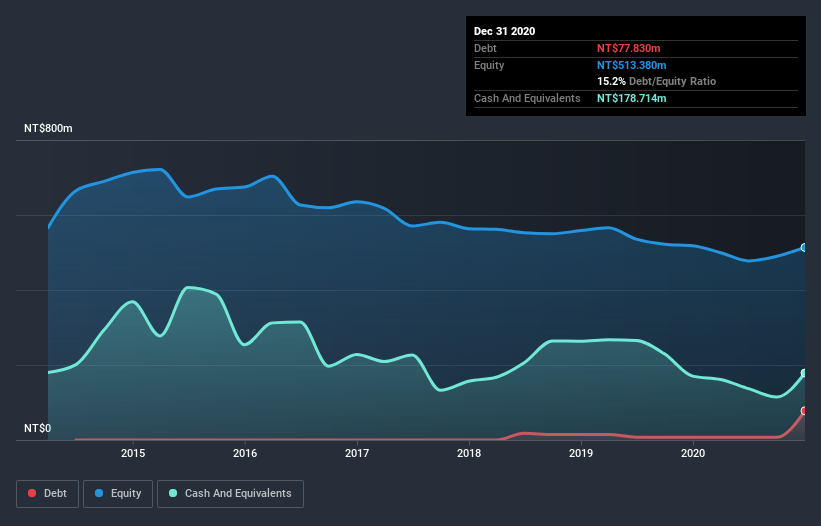Legendary fund manager Li Lu (who Charlie Munger backed) once said, 'The biggest investment risk is not the volatility of prices, but whether you will suffer a permanent loss of capital.' So it might be obvious that you need to consider debt, when you think about how risky any given stock is, because too much debt can sink a company. Importantly, Da Hui Limited (GTSM:5276) does carry debt. But the more important question is: how much risk is that debt creating?
What Risk Does Debt Bring?
Debt and other liabilities become risky for a business when it cannot easily fulfill those obligations, either with free cash flow or by raising capital at an attractive price. Ultimately, if the company can't fulfill its legal obligations to repay debt, shareholders could walk away with nothing. However, a more frequent (but still costly) occurrence is where a company must issue shares at bargain-basement prices, permanently diluting shareholders, just to shore up its balance sheet. Of course, plenty of companies use debt to fund growth, without any negative consequences. The first step when considering a company's debt levels is to consider its cash and debt together.
Check out our latest analysis for Da Hui
How Much Debt Does Da Hui Carry?
As you can see below, at the end of December 2020, Da Hui had NT$77.8m of debt, up from NT$7.40m a year ago. Click the image for more detail. However, it does have NT$178.7m in cash offsetting this, leading to net cash of NT$100.9m.

How Strong Is Da Hui's Balance Sheet?
We can see from the most recent balance sheet that Da Hui had liabilities of NT$302.1m falling due within a year, and liabilities of NT$11.9m due beyond that. On the other hand, it had cash of NT$178.7m and NT$200.0m worth of receivables due within a year. So it actually has NT$64.6m more liquid assets than total liabilities.
This surplus suggests that Da Hui has a conservative balance sheet, and could probably eliminate its debt without much difficulty. Simply put, the fact that Da Hui has more cash than debt is arguably a good indication that it can manage its debt safely.
Although Da Hui made a loss at the EBIT level, last year, it was also good to see that it generated NT$7.7m in EBIT over the last twelve months. When analysing debt levels, the balance sheet is the obvious place to start. But it is Da Hui's earnings that will influence how the balance sheet holds up in the future. So if you're keen to discover more about its earnings, it might be worth checking out this graph of its long term earnings trend.
Finally, while the tax-man may adore accounting profits, lenders only accept cold hard cash. While Da Hui has net cash on its balance sheet, it's still worth taking a look at its ability to convert earnings before interest and tax (EBIT) to free cash flow, to help us understand how quickly it is building (or eroding) that cash balance. Over the last year, Da Hui saw substantial negative free cash flow, in total. While that may be a result of expenditure for growth, it does make the debt far more risky.
Summing up
While it is always sensible to investigate a company's debt, in this case Da Hui has NT$100.9m in net cash and a decent-looking balance sheet. So we don't have any problem with Da Hui's use of debt. The balance sheet is clearly the area to focus on when you are analysing debt. However, not all investment risk resides within the balance sheet - far from it. For instance, we've identified 2 warning signs for Da Hui (1 is potentially serious) you should be aware of.
Of course, if you're the type of investor who prefers buying stocks without the burden of debt, then don't hesitate to discover our exclusive list of net cash growth stocks, today.
If you’re looking to trade Da Hui, open an account with the lowest-cost* platform trusted by professionals, Interactive Brokers. Their clients from over 200 countries and territories trade stocks, options, futures, forex, bonds and funds worldwide from a single integrated account. Promoted
New: Manage All Your Stock Portfolios in One Place
We've created the ultimate portfolio companion for stock investors, and it's free.
• Connect an unlimited number of Portfolios and see your total in one currency
• Be alerted to new Warning Signs or Risks via email or mobile
• Track the Fair Value of your stocks
This article by Simply Wall St is general in nature. It does not constitute a recommendation to buy or sell any stock, and does not take account of your objectives, or your financial situation. We aim to bring you long-term focused analysis driven by fundamental data. Note that our analysis may not factor in the latest price-sensitive company announcements or qualitative material. Simply Wall St has no position in any stocks mentioned.
*Interactive Brokers Rated Lowest Cost Broker by StockBrokers.com Annual Online Review 2020
Have feedback on this article? Concerned about the content? Get in touch with us directly. Alternatively, email editorial-team (at) simplywallst.com.
About TPEX:5276
Da Hui
An investment holding company, engages in the production and sale of motorcycle components and child safety seats in the United States, Malaysia, and internationally.
Solid track record with excellent balance sheet.
Market Insights
Community Narratives



